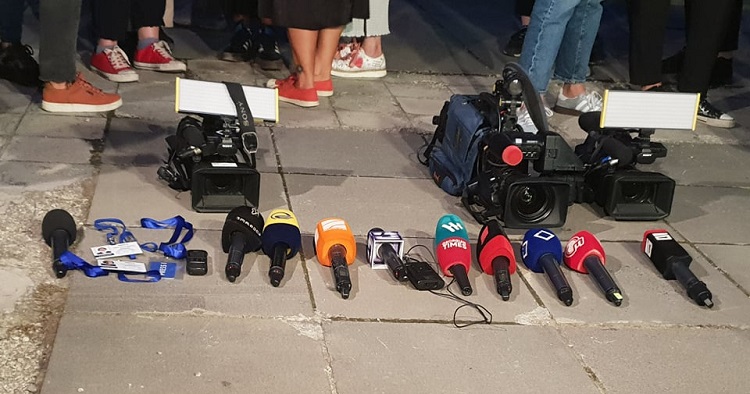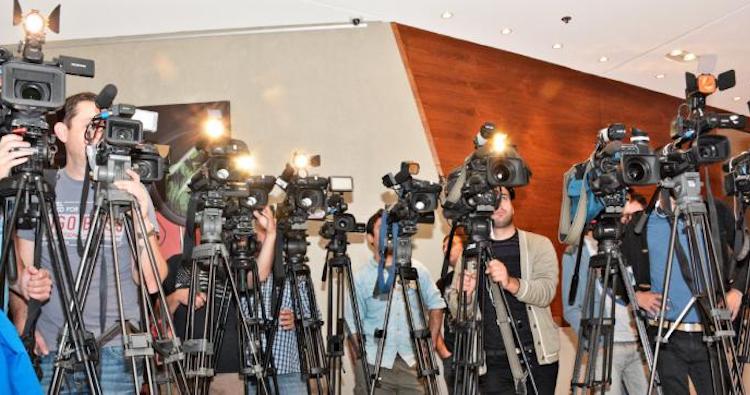EU, UNDP media monitoring results show increased tensions between Georgian media camps

The EU-funded monitoring of media coverage of local elections covers 54 media outlets, including 27 national and 27 regional. Photo: Nino Alavidze/Agenda.ge
Findings of the media monitoring research released by the European Union (EU) and UNDP earlier today show that ‘tensions between media camps have only increased’ between the parliamentary elections in 2020 and the local elections in 2021.
Moreover, ‘deep partisan divisions’ have defined the electoral media environment in Georgia throughout all recent elections.
Deep partisan divisions in Georgian #media have only increased between parliamentary elections 2020 & local elections 2021.
— UNDP in Georgia ???????? (@UNDPGeorgia) September 30, 2021
In the run-up to local #elections, @EUinGeorgia @UNDPGeorgia release the first findings of election media monitoring.https://t.co/yfsEdeGpUK
Based on the monitoring results, in the pre-election monitoring period between July and September ‘polarization was pronounced across all sectors of the national and, to a lesser degree, regional and local media’.
Some of the media outlets, which were ‘relatively balanced last year, are now showing clear signs of political preference’.
Political divisions on television were most evident in July when homophobic pogroms and violent attacks on journalists dominated the media agenda. Although all national televisions closely followed the events, most of them manipulated their audiences by spreading political bias and negatively portraying political forces they did not favour. Facebook pages of the national televisions mirrored this trend by backing certain political forces and demeaning others", the monitoring report says.
It also notes that regional and local televisions were ‘more focused on covering national news than local developments but failed to provide their audiences with high-quality information’.
Polarization and political bias have increased on national radios, a traditionally balanced and neutral media sector. Regional radios, though less biased in their reporting, did not provide critical analysis of the events and often used unverified information. Both national and regional radios tried to follow journalistic standards and refrained from discriminatory or abusive language".
Unverified sources of information and offensive language ‘remained an issue in national print media’, while regional and local newspapers offered a relatively impartial account of events and a diversity of opinions.
Today we released the results of the pre-election media monitoring together with @UNDPGeorgia. Monitoring of 54 national and regional media outlets showed increased division and polarisation in Georgian media.
— EU Delegation Georgia ???????? (@EUinGeorgia) September 30, 2021
Find out more: https://t.co/cLt5wG9IGB pic.twitter.com/OxP5x92fS7
The situation was different in the digital media sector.
National publications were less polarized and more informative and balanced, while regional and local digital media outlets lent to political favouritism and used untrustworthy information sources. However, compared to television, political pressures and polarization were notably less evident across the entire digital media sector".
Compared to the 2020 electoral cycle, fewer cases of gender-discriminatory language were registered during the monitoring period across all media sectors.
Deputy Head of Political Section at the Delegation of the European Union to Georgia Evija Kotan said that ‘the media landscape mirrors polarization in the Georgian society which becomes especially evident at a time of elections’.
Voters place their trust in the media to make an informed choice at the ballot boxes. The Georgian media can be praised for featuring a wide range of opinions and party options. However, political bias, unethical reporting and unverified sources of information remain a problem in many parts of the media", UNDP Deputy Head in Georgia Anna Chernyshova said.
The EU-funded monitoring of media coverage of local elections covers 54 media outlets, including 27 national and 27 regional.
Media research will continue throughout the electoral cycle, covering an election campaign, election day and a post-election period.
 Tweet
Tweet  Share
Share


